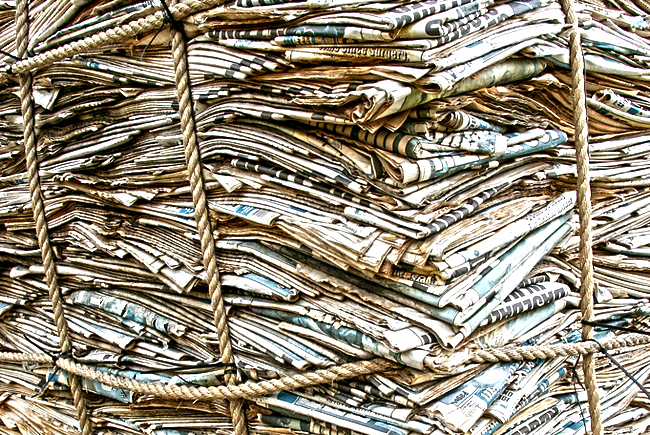Business Maverick, Media, Politics, South Africa
Press Freedom Commission, ANC and the little guy

Against the backdrop of a shameful fall in South Africa’s media freedom rating worldwide, the report of the Press Freedom Commission – the second media freedom review process following the ANC’s calls for a media appeals tribunal – was published last week. JULIE REID takes a satellite view of processes, perspectives and possibilities.
Anyone interested in press regulation in South Africa and media freedom in general, will be aware of the main recommendations contained in the Press Freedom Commission report released last week. However, the reality is, while news of the fairly substantial recommendations made by the Press Freedom Commission on how to best reform the South African Press Council garners acute interest from print editors and print media bodies like the SA National Editors’ Forum, this news will not and does not interest all that many “people on the ground”.
During the first review of South Africa’s press regulatory system, the Press Council received a total of 58 submissions from the public, and the second review collected nearly 230 submissions. That kind of public consultation is impressive when you consider that most laws are drafted and adopted in this country without ever reaching the same levels of public input or consultation.
That said, most of those submissions were made by people or organisations that have a particular interest in the media and freedom of expression. The Press Council and Press Freedom Commission heard from civil society groups, university academics from journalism and media studies departments, political parties and newspaper editors. Precious few of the presentations were from ordinary people who read the press each day, and on whom the media exercises its most powerful influence.
Throughout the processes, I argued that ordinary everyday readers of South Africa’s newspapers had no real motivation to be involved in the process of press regulation because, until now, that process had effectively excluded them. The complaints procedure of the Press Council did not allow for third party complaints, which is inconsistent with other media regulatory bodies, such as the Broadcasting Complaints Commission of South Africa (BCCSA) or the Advertising Standards Authority (ASA).
What this means is that media users could lay complaints with a regulatory body about what they saw on television, heard on radio or the content of an advertisement. But if a reader felt aggrieved about the content of a print publication, they could not lay an official complaint with the press complaints body unless the offending story somehow directly affected them. Obviously the likelihood of that happening remains slim, so the Press Ombudsman receives complaints mostly from public figures. Whether or not the reader on the ground was happy with the content of a particular newspaper was effectively irrelevant. So it is understandable that the general public would not be perturbed by the review because it had been largely ignored by this body all along.
The Press Freedom Commission report has changed that.
The report recommends the definition of the complainant be changed to allow for persons, who may not be directly connected to a particular news story, to lay a complaint about the offending story anyway, so long as the complaint is in the public interest. In fact, it gets better: the new definition of the complainant directly echoes the text of Section 38 of the Constitution, which is such a simple and eloquent solution to this conundrum that it smells of genius. But what does this mean for the common reader of the daily paper? Perhaps the best way to understand that is to recall some examples of the publication of potentially offensive imagery in the press.
Last year the Sowetan caused uproar when it published images of a sex act on its front page. Many readers were outraged, but because of the formulation of the Press Council’s complaints procedure at the time, no one except the two people having sex could lay a complaint. But the public interest factor in this case was huge, especially when considering the prominence of the story and the possibility of children being exposed to its content. The Press Code has always discouraged the publication of overly explicit images of violence, brutality or suffering. Yet who cannot remember pictures of Gaddafi as he was being killed, the bloated corpses of victims of the Asian tsunami, a dead Andries Tatane or dead Iraqi soldiers pictured during the Shock and Awe campaign. Last week’s Mail & Guardian contained a horrific picture of a dead soldier from the Sudan Armed Forces, headless, badly decomposed and lying in a pool of muddy water.
It is, of course, arguable these images are in the public interest and deserve publication. But it is also probable some readers may not feel this to be the case and, in fairness, should be permitted the opportunity to raise the matter with the Press Council. If third party complaints were prohibited, the only one who could complain about the picture in the M&G, at the risk of sounding callous, would be the dead soldier.
To its credit, the Press Freedom Commission report contains notable emphasis on the press’s treatment and representation of children, but also mentions how publications should take child readers into account when considering the publication of sensitive material. When taking this angle, third party complaints become important because members of the public are in a way enabled to enact some kind of moral suasion on the press. And all this only concerns imagery. The possibility for readers to respond or complain about the accuracy or even the tone of reporting is potentially more far-reaching.
None of this really matters, if Sanef and the PMSA elect not to accept the recommendations of the inclusion of third party complaints, and do not reformulate the Press Council’s complaints procedure. Further, none of it matters if the public is not made aware of this new possibility. For that to happen, the Press Council will need to do a great deal of marketing and popular education (as the BCCSA has done). Thereafter, it will be for the press-reading public to become monitors of the press, and start taking an active role in engaging with the content of our press. So, it may be some time yet before the Press Council starts receiving bundles of third party complaints. But for the first time the possibility is there.
In the interim, the politic-talking analysts, for their part, are asking only one question: how will the ANC react to the Press Freedom Commission report and will it go ahead with Parliamentary discussions on a media appeals tribunal?
Of course, it is the ANC’s right to suggest that such discussions be tabled in Parliament. But to do so now may cause the ANC more embarrassment than it wishes to stomach. At the Press Freedom Commission’s oral hearings Jesse Duarte and Jackson Mthembu complained bitterly that the press had misrepresented what the ruling party envisaged as a regulatory body for the press and stated that the ANC had never suggested a statutory body be established.
Instead, said the ANC, an independent mechanism was the most desirable device for press regulation, which should be independent of political interests. The Press Freedom Commission suggested South Africa’s press accountability mechanism be changed from a self-regulatory one, to what it calls a system of independent co-regulation – a cooperation between representatives of the press and the public, but not of government. Effectively, the commission did what it could to give the ANC something pretty close to what it wanted. If the ANC continues to beat the media appeals tribunal drum now, the press fraternity can quite rightly ask, “What more can we possibly do to make you happy?”. If the ANC thought that some where making it out to be the bully of the press before, then taking the media appeals tribunal to Parliament could make matters worse.
But this thing called the “general public” is a strange animal. Many presenters at the oral hearings in both review processes indicated a general distrust among the public of the press. Ask just about anyone who reads newspapers on a regular basis, whether they fully trust everything they read in the press to be true, and the answer will almost always be “No”. But without thinking, that same reader will skim over the daily headlines and ask, “Have you heard the latest news?”, believing every word they had read.
The truth is, most of us do not doubt what we see in the papers – at least not immediately. Which is what makes it so important for the press to get things right. Improving the quality of journalism is important work, and the Press Council has an essential and difficult role to play in that. Problems range from sensationalist and irresponsible reporting, laziness in fact-checking, the publication of inaccuracies and so on. All of that is important and needs attention.
Nonetheless, amid such discussions on the supposed deteriorating quality of journalism, one is still haunted by the suspicion that we are not having any of these discussions now because some journalists have done a bad job. The unnerving nightmare is that we may be talking about the regulation of the press now because some very courageous journalists in our country have, over the past few years, done a very good job, and made some very important people very uncomfortable.
On 3 May a number of countries around the globe will celebrate World Press Freedom Day. On this day we should remember that South Africa’s press freedom rating has slipped dramatically on global press freedom indices since 2008 and we no longer have a free press rating. The press has voluntarily suffered two rigorous processes of painful introspection with regard to how it regulates itself.
Perhaps it is time too for the ANC to do some rigorous introspection on how it’s rash rhetoric against the press contributed to the fall in South Africa’s press freedom rating which, in the interest of freedom of expression, is an ugly blemish on the face of any democracy. DM
Dr Julie Reid is a media academic, analyst and media freedom activist at the department of communication science at Unisa, and the deputy president of the South African Communications Association (Sacomm). She is an active member of the Right2Know Campaign and tweets about media matters as @jbjreid.



















 Become an Insider
Become an Insider